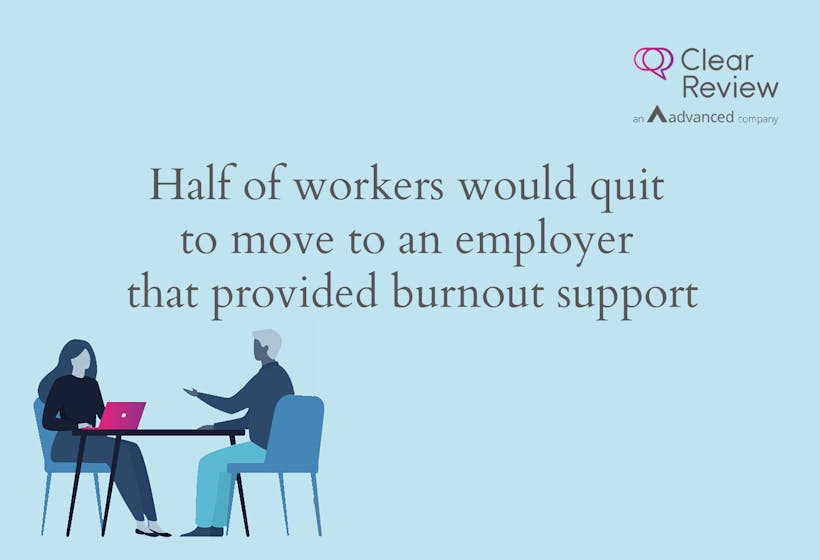
Report highlights gap between managers and employees on burnout and stress
- 51% of employees would leave current role and move to new company if better support for stress/burnout was available
- 48% of employees don’t feel their manager takes any steps to help them avoid burnout
- Yet 89% of managers say they can support stressed or burnout employees
- New report suggests drop in performance management contributing to gap between manager and employee perceptions
More than half of UK based employees would leave their jobs in favour organisations that can offer better support for stress and burnout. A new report, Performance Management Report 2022, by Clear Review, an Advanced company also reveals that nearly half of workers don’t feel their managers take any steps to help them avoid the problem of burnout – a problem which impacts over 800,000 British workers with over half reporting that this is due to the pandemic.
This is despite 97 per cent of managers reporting they are equipped to recognise stressed and unengaged members of their team, and 89 per cent saying they are equipped to support said employees.
The gap comes at a time when employers are already struggling to retain talent in the wake of the Great Resignation – in fact, 39% of employers have current hard-to-fill vacancies. With levels of stress and burnout reaching new heights in the wake of the pandemic, companies are conscious they need to tackle burnout, with 84 per cent of HR directors believing it to be a major issue that needs addressing.
Nick Gallimore, Director of Talent Transformation and Insight at Advanced, said: “While it’s heartening to see that businesses do recognise the prevalence of stress and burnout among their employees, the gap between what managers believe and what employees see is a significant cause for concern. The consequences are clear and should be a wakeup call for employers already struggling to retain and attract the right talent.”
The report also noted that performance management is not receiving the priority focus it once was. Two thirds (65 per cent) of HR directors believe performance management has been put on the back burner, with a third of employees having a performance conversation once a year or less. At the same time, greater priority has been placed on productivity and engagement, which is a focus for 48 per cent of organisations this year, compared with 33 per cent in 2021.
Gallimore added: “Productivity and engagement are critical to business results, but so too are engaged, committed and motivated staff. It is noticeable that as performance management slips from focus, so we see this gap developing between how managers think they’re tackling burnout and how they actually are. Regular contact with employees to cover goal setting, development, engagement and generally facilitating open feedback and communication are fundamental to being able to identify how employees are doing; not just from a performance perspective, but from a stress one too.”
Author and leadership expert, Mike Parkes, commented on the findings: “As remote working prevails for many workers, the virtual workplace is increasingly becoming transactional, with individuals consumed by a daily deluge of emails and meetings, often just to get the basics achieved. Individuals are having to work harder to compensate for the lack of collaboration and engagement that naturally occurs in a vibrant workplace as indicated by the report. Though managers seem to have the intent to spot the pressures of their team members, the virtual world is inhibiting this through the lack of the natural conversation.
“This too could largely account for the report’s highlighting of the drop off in performance management. Those informal conversations contribute so significantly to the daily management of performance that this vacuum reduces the success of the more formal performance management process, though one might argue that with this as a backdrop, managers need to give even more due care and attention at harnessing individual engagement and performance.”
The Performance Management Report 2022 is available to download now.
Clear Review, an Advanced company, surveyed 1150 HR decision makers, managers and employees in the UK and USA.
For media enquiries, please contact:
Joanna Drake +44(0)7584 498029 / joanna@fireworkpr.co.uk
Courtney Glymph +44(0)7867488769 / courtney@fireworkpr.co.uk
Performance Management Report 2022
Are employees as productive as we think they are?